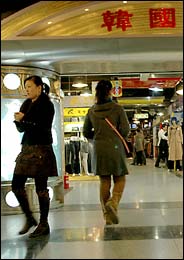|
China's youth look to Seoul for inspiration
(New York Times)
Updated: 2006-01-04 09:03
To young Chinese shoppers, it seemed not to matter that some of the products,
like New York Yankees caps or Japan's Astro Boy dolls, clearly have little to do
with South Korea. Or that most items originated, in fact, in Chinese factories.

At Korea City in the Xidan Shopping Center
in Beijing, shops offer a taste of South Korean styles.
[NYT] | "We know that the products at Korea
City are made in China," said Wang Ying, 28, who works for the local branch of
an American company. "But to many young people, 'Korea' stands for fashionable
or stylish. So they copy the Korean style."
From clothes to hairstyle, music to television dramas, South Korea has been
defining the tastes of many Chinese and other Asians for the past half decade.
As part of what the Chinese call the Korean Wave of pop culture, a television
drama about a royal cook, "The Jewel in the Palace," is garnering record ratings
throughout Asia, and Rain, a 23-year-old singer from Seoul, drew more than
40,000 fans to a sold-out concert at a sports stadium in Beijing in
October.
But South Korea's "soft power" also extends to the material and spiritual
spheres. Samsung's cellphones and televisions are symbols of a coveted
consumerism for many Chinese. Christianity, in the evangelical form championed
by Korean missionaries deployed throughout China, is finding Chinese converts
despite Beijing's efforts to rein in the spread of the religion. South Korea
acts as a filter for Western values, experts say, making them more palatable to
Chinese and other Asians.
For a country that has been influenced by other cultures, especially China
but also Japan and America, South Korea finds itself at a turning point in its
new role as exporter.
The transformation began with South Korea's democratization in the late
1980's, which unleashed sweeping domestic changes. As its democracy and economy
have matured, its influence on the rest of Asia, negligible until a decade ago,
has grown accordingly. Its cultural exports have even caused complaints about
cultural invasion in China and Vietnam.
Historically, Christianity made little headway in East Asia, except in South
Korea, whose population is now about 30 percent Christian and whose overseas
missionary movement is the world's second largest after the United States.
Today, in China, South Korean missionaries are bringing Christianity with an
Asian face. South Korean movies and dramas about urban professionals in Seoul,
though not overtly political, present images of modern lives centering on
individual happiness and sophisticated consumerism.
|